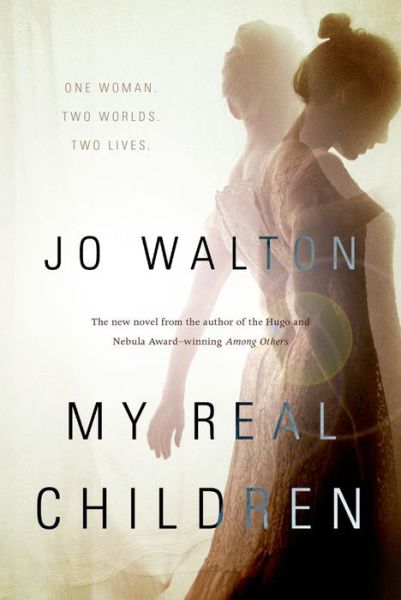A wise person once told me that 50% of your life’s happiness derives from one decision: who will be your significant other? Or possibly I just heard it on Dr. Phil—I don’t know. In either case, Jo Walton’s lovely new novel My Real Children is an illustration of that idea.
Patricia Cowan, suffering from dementia, struggles to remember her daily life. She writes endless lists in her retirement home, trying to remind herself of all the little facts and tasks that are slipping away. The nurses track her mental state on her chart: “Confused Today,” it says one day, or “Very Confused,” or sometimes just “VC.” Patricia can only agree, and try to hold on as her grasp on reality inexorably fades.
What makes things even more confusing for Patricia is that she appears to have two separate sets of memories. She remembers two distinct lives that both feel entirely real and true to her. In one life, she married Mark and had four children. In the other, she never married him and raised three children with Bee instead.
There are other major differences. In one version of her life, John F. Kennedy was assassinated. In the other he wasn’t, but decided not to run for a second term after the Cuban Missile Exchange laid waste to Miami and Kiev. In one life, there’s a scientific research station on the moon; in the other, nuclear missiles. The split in Patricia’s memories seems to have started with that one decision: whether she agreed to marry Mark, or not.
My Real Children’s opening chapter has a mournful, elegiac tone: the elderly, forgetful Patricia tries to make sense of her failing memory and her double past. Reading this section of the novel is borderline uncomfortable, as you experience the existential dread of not just losing your memory, but not being certain which of those memories are real—if any.
After that painfully confusing chapter, the novel switches gears, jumping eighty years into the past to Patricia’s youth. Sunny vacation days on the beach, friends, parents—the contrast is blinding. The young Patricia goes to Oxford, meets a promising young scholar named Mark, and then, when he presents her with an ultimatum-like “now or never” marriage proposal, her life splits in two.
The rest of the novel, showing Patricia’s divergent lives in alternating chapters, is an odd set of contrasts. In her life as Tricia, misery and unhappiness under the thumb of an oppressive husband; in her life as Pat, blissful love with her partner Bee. In one, a life mostly lived in England; in the other, a career as a travel writer including long stays in Italy. In each life, as in every life, there are ups and downs, but taken all together, there’s a distinctly different tone between Tricia’s life and Pat’s.
Strangest of all, My Real Children has an etheric, unreal quality to it, despite the utterly realistic way it describes the everyday lives of Pat and Tricia. Frankly speaking, some of the sections that sum up the lives and accomplishments of Pat/Tricia’s children read like a family newsletter, but because you’re never quite sure what’s real, even the most domestic scenes maintain an aura of mystery.
Early on in the novel, the elderly Patricia thinks back to a children’s novel she once read to a class: Penelope Farmer’s Charlotte Sometimes, about a girl in a boarding school who, one morning, wakes up to find herself forty years in the past, where another girl believes she’s her sister Clare. The opening sentence of the novel is “By bedtime all the faces, the voices, had blurred for Charlotte to one face, one voice.” Patricia’s short term memory may be a blur, but the faces and voices of her two pasts remain clear and distinct.
With My Real Children, Jo Walton has added a Philip K. Dick-like layer of existential confusion to the idea behind that famous children’s novel: Patricia Sometimes, eternally confused and in the final stages of her life, thinks back on her two pasts. Rather than waking up in a different time, her memories take place in different worlds.
“Two roads diverged in a yellow wood”, as Robert Frost’s famous poem starts—and Patricia somehow traveled both of them. My Real Children is a beautiful novel about life, love, and loss, and—no pun intended—a truly memorable reading experience.
Stefan Raets reads and reviews science fiction and fantasy whenever he isn’t distracted by less important things like eating and sleeping. You can find him on Twitter, and his website is Far Beyond Reality.










